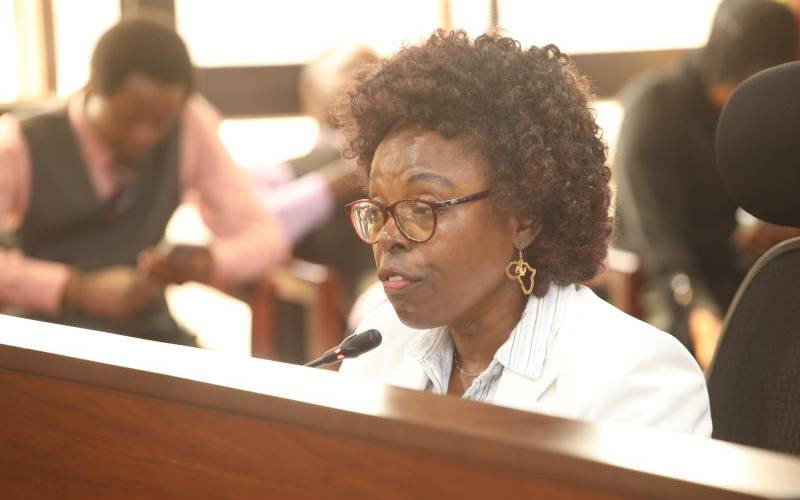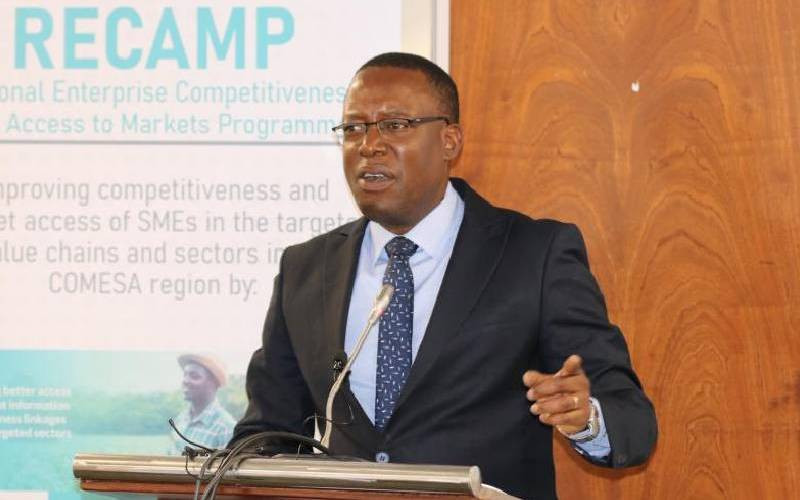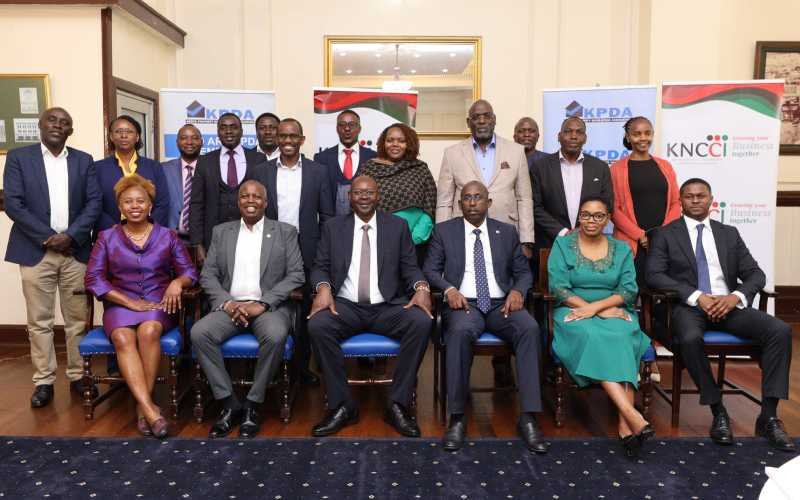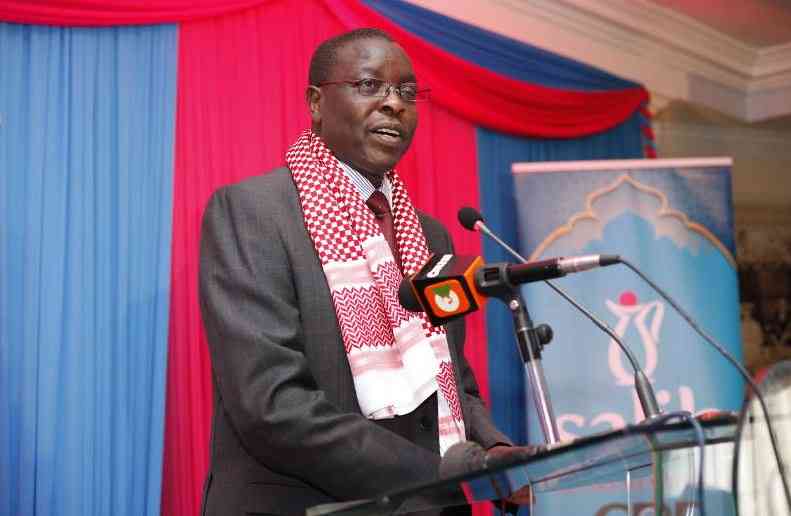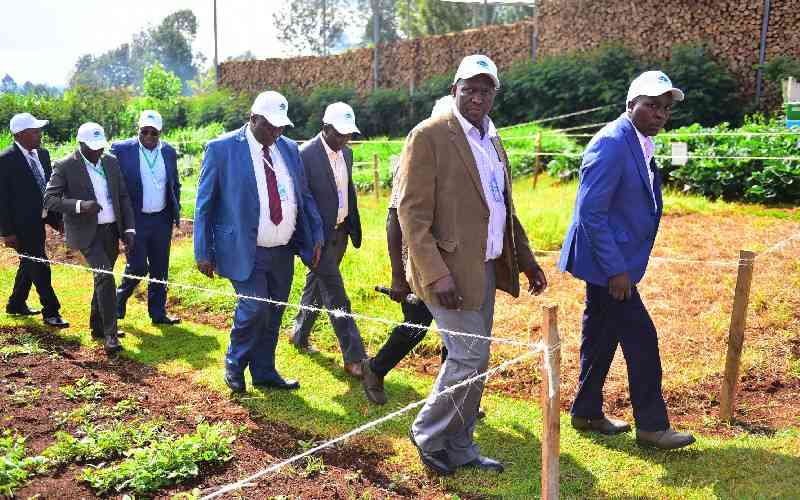
Stakeholders tour the model farm during the launch of Maziwa Faida project at Githunguri Dairies, Kiambu, on September 1, 2025. [Rachel Kabui, Standard]
Smallholder dairy farmers in Kiambu County are set to benefit from a new $3.5 million (Sh451.5 billion) public-private development partnership project.
Dubbed Maziwa Faida (milk for profit), the initiative, launched on Monday at the Githunguri Dairy Farmers Cooperative Society (GDFCS), ushers in fresh hope for smallholder farmers, who account for the bulk of milk producers in the county and the country at large.
While dairy farming remains a lifeline for millions of Kenyan households, many farmers continue to face cycles of poor profitability due to low output and inadequate technical capacity.
Emerging challenges such as climate change and diseases have further exacerbated these challenges.
The initiative aims to make dairy farming more profitable, enhance the quality of milk supplied to GDFCS, and promote the inclusion of women and youth in the dairy value chain.
It will also emphasise environmentally sustainable farming practices.
A key component of the project is the establishment of a Dairy Academy at Githunguri, envisioned as a centre of excellence to train farm advisors and smallholder farmers in modern dairy farming techniques, animal health, farm management, recordkeeping, and business skills.
The two-year initiative brings together the United Nations Industrial Development Organisation (UNIDO), Tetra Pak, and the Githunguri Dairy Farmers Cooperative Society, with funding support from Sida through the Embassy of Sweden in Nairobi.
It builds on the success of a Dairy Hub model introduced in 2022 by Tetra Pak East Africa, its Food for Development team, and GDFCS.
During its implementation, between September 2022 and December 2024, farm profitability increased by 26 per cent, milk yield per cow rose by 17 per cent, and milk collection per farm surged by 92 per cent.
Stakeholders after the launch of the Maziwa Faida project at Githunguri Dairies, Kiambu, on September 1, 2025. [Rachel Kabui, Standard]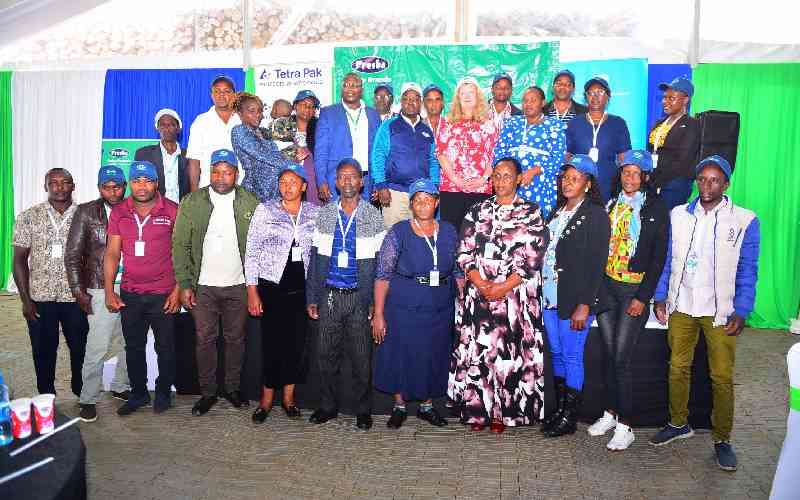
Farmers also experienced a 103 per cent increase in margin above feed cost and a 71 per cent reduction in milk rejections.
Speaking during the launch, Kenya Deputy Country Representative at UNIDO Lynette Luvai expressed optimism about the initiative, saying it would improve the farmers’ livelihoods.
Stay informed. Subscribe to our newsletter
“I am excited to be part of this project, which has great potential to increase production and subsequently boost income for farmers from the Githunguri Dairy Farmers Society,” she said.
Her sentiments were echoed by Counsellor and Head of Section for Kenya Development Cooperation at the Embassy of Sweden in Nairobi Marie Ottosson, who noted the project’s potential to unlock opportunities for marginalised groups.
“The Embassy of Sweden is pleased to support the Pathways to profitable dairy farming project for the Githunguri Dairy Farmers Society to increase milk production and enhance job creation, especially for the youth and women,” she said.
Chairman of the Githunguri Dairy Farmers Co-operative Society John Ndichu hailed the project as a turning point for farmers.
“It has already yielded positive results, with farmers starting to record increased milk production at the farm level. According to records, the society has been steadily growing, with daily milk delivery rising from 90,000 litres to 250,000 litres, with a forecast of reaching 350,000 litres per day by 2027,” he said.
He further highlighted the role of the society’s demonstration model farm, which has become a learning hub for dairy farmers.
“The demonstration model farm has equipped the dairy farmers with the necessary knowledge and new skills, which will translate to maximum benefit. So far, the demonstration farm is attracting farmers from across the country and the region,” he added.
Through the project, plans are underway to train more than 10,000 smallholder farmers in better dairy farming practices, with a strong emphasis on including women and youth.
It will also strengthen the capacity of farm advisors and extension officers while raising milk quality standards. Collaboration with national and county stakeholders will be critical to scaling up the Dairy Hub concept, with the ultimate goal of ensuring the financial sustainability of the Dairy Academy.
Managing Director, Market East Africa, Tetra Pak, Jonathan Kinisuunderlined the importance of capacity building for long-term transformation.
“Building the capacity of customers via farm advisors and smallholder farmers through targeted training and collaboration is essential for creating a sustainable and inclusive dairy industry in Kenya,” he said.
Vice President, Food for Development at Tetra Pak, Rafael Fabrega, reaffirmed the project’s commitment to sustainability and inclusivity.
“By integrating technical training with market access and environmentally sustainable practices, we aim to transform smallholder dairy farming into a profitable and resilient livelihood for women and youth,” he said.
Through the Dairy Hub model, farmers will not only have access to a stable buyer for their milk but also be provided with technical training and advisory services to gradually increase production and profitability.
By working step by step with farmers through a network of trained advisors, the Dairy Hub seeks to transform Kenya’s dairy industry from the grassroots up, creating a pathway to profitability and resilience for smallholder farmers.
